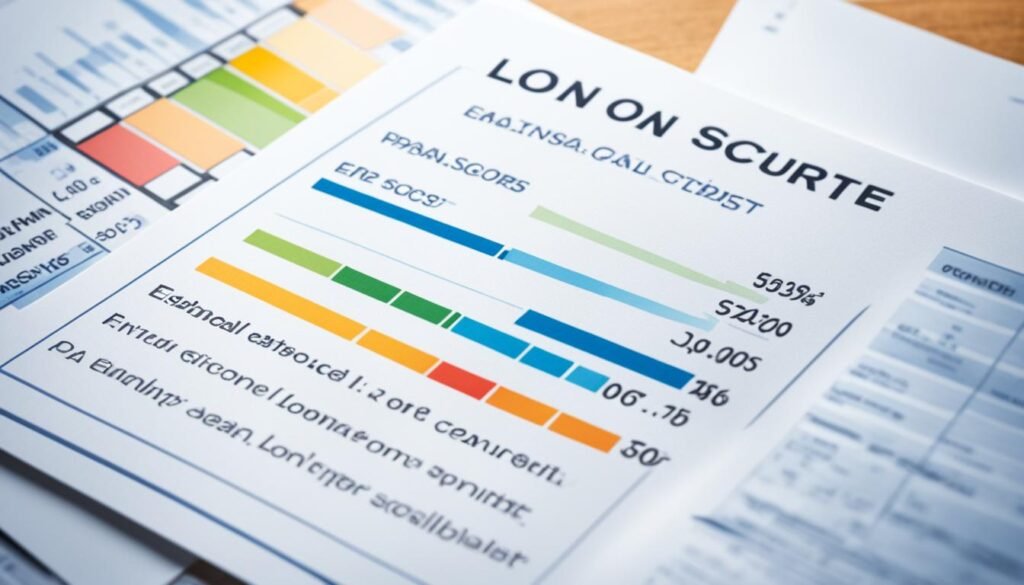How To Get A Loan, particularly a personal loan, can be a helpful financial tool for many people. Personal loans are often used for various expenses, such as vacations, weddings, or unexpected medical bills. They are considered a popular option because they are unsecured loans, meaning no collateral is required. In India, for example, 77% of working individuals rely on personal loans to meet their financial needs. To qualify for a personal loan, lenders have specific eligibility conditions that borrowers must meet. The repayment tenure and interest rates are also important factors to consider when applying for a personal loan.
Key Takeaways: How To Get A Loan
- Personal loans are versatile and flexible options for various expenses
- No collateral is required for personal loans, making them accessible
- Lenders have specific eligibility criteria that borrowers must meet
- The repayment tenure and interest rates are crucial factors to consider
- Personal loans can be a valuable financial tool for meeting different needs
Why Personal Loans Are Popular
Personal loans have gained popularity for several reasons. One key factor is that they are unsecured loans, which means borrowers do not need to provide collateral. This saves borrowers from the burden of providing assets like homes or cars as security.
Additionally, personal loans can be used for various purposes, making them versatile and flexible. Borrowers can use the funds for debt consolidation, home renovations, or even funding special events like weddings or vacations.
Another advantage of personal loans is that the interest rates are fixed, providing borrowers with a steady repayment plan.
| Loan Purpose | Interest Rates |
|---|---|
| Debt consolidation | 5.25% – 10.99% |
| Home renovations | 6.99% – 12.99% |
| Special events | 7.99% – 15.99% |
Understanding Personal Loan Eligibility

To qualify for a personal loan, borrowers need to meet specific eligibility criteria. These criteria may vary from lender to lender, but common requirements include:
- Being of legal age (usually between 18-60 years)
- Being an Indian citizen
- Having a minimum work experience of at least 12 months
- Earning a minimum monthly salary of INR 15,000 or more
Borrowers must also provide necessary documentation to support their loan application. This includes:
- Identification proof
- Address proof
- Income proof
- Recent photographs
Having a good credit score is also crucial for loan approval. Lenders assess creditworthiness by considering the borrower’s credit score, which reflects their history of managing credit and debt.
Meeting the Eligibility Criteria
Before applying for a personal loan, it’s important to ensure that you meet the eligibility criteria set by the lender. This will increase your chances of loan approval and make the application process smoother.
“By meeting the minimum age requirement, being an Indian citizen, and satisfying the work experience and income criteria, you fulfill the fundamental eligibility conditions for a personal loan.”
Additionally, it’s crucial to gather the required documentation in advance. This will help speed up the loan application process and avoid any unnecessary delays.
“Preparing your identification proof, address proof, income proof, and recent photographs in advance will ensure a smooth application process.”
Building a Strong Credit Score
Your credit score plays a significant role in determining your eligibility for a personal loan. A higher credit score indicates responsible credit management and increases the likelihood of loan approval.
“Maintaining a good credit score requires timely repayment of existing debts, avoiding excessive credit utilization, and managing a diverse credit portfolio.”
By understanding and actively managing your credit score, you can enhance your eligibility for personal loans and secure better loan terms.
Tips to Improve Personal Loan Eligibility

To increase your chances of qualifying for a personal loan, there are several strategies you can implement. Improving your credit score, managing your debt-to-income ratio, and considering a co-applicant are all effective methods to enhance your eligibility. Implementing these tips can help you secure a loan with favorable terms and potentially save you money in the long run.
1. Maintain a Good Credit Score
One crucial factor that lenders consider when assessing your personal loan eligibility is your credit score. A higher credit score demonstrates your ability to manage credit responsibly. To improve your credit score, make sure to pay your bills and loan EMIs on time. This will show lenders that you are a reliable borrower. Additionally, minimizing your credit utilization by keeping your credit card balances low can have a positive impact on your credit score. Finally, having a diverse credit portfolio, including different types of credit such as credit cards, loans, and mortgages, can also contribute to a better credit score.
2. Manage Your Debt-to-Income Ratio
The debt-to-income ratio is the percentage of your monthly income that goes towards debt payments. Lenders use this ratio to assess your ability to handle additional debt. To improve your eligibility, work on reducing your overall debt. Paying off outstanding loans or credit card balances can help lower your debt-to-income ratio. Additionally, increasing your income, such as through a raise or additional source of income, can also improve this ratio. By managing your debt-to-income ratio effectively, you show lenders that you have the financial capacity to take on a personal loan.
3. Consider a Co-applicant
If you have a co-applicant with a strong credit score or a higher income, you can significantly improve your chances of loan approval. Including a co-applicant adds an additional layer of creditworthiness to your application. Lenders often consider the income and credit history of both applicants when evaluating the loan. This can boost your eligibility and even secure a lower interest rate. However, it’s important to note that by including a co-applicant, they will also be equally responsible for repaying the loan.
Implementing these tips can enhance your personal loan eligibility and increase your chances of approval. By maintaining a good credit score, managing your debt-to-income ratio, and considering a co-applicant, you’ll be on the right path towards securing the loan you need.
| Tips to Improve Personal Loan Eligibility |
|---|
| Maintain a Good Credit Score |
| Manage Your Debt-to-Income Ratio |
| Consider a Co-applicant |
When it comes to obtaining a personal loan, it’s crucial to conduct thorough research and compare different lenders to find the best option that suits your specific needs. In your search for personal loan lenders, consider online lenders, banks, and credit unions.
Online lenders are known for their quick and streamlined application process, making it convenient for borrowers who prefer a digital experience. They often offer competitive interest rates and flexible loan options.
Traditional banks, on the other hand, provide the security and reliability of well-established financial institutions. They offer personal loans with various terms and repayment options, making it easier for borrowers to find a loan that fits their requirements.
Credit unions are another option to consider, especially if you have a lower credit score or specific lending needs. They might provide more flexibility and personalized loan options.
When comparing personal loan lenders, several factors should be taken into account:
- Interest rates: Compare the interest rates offered by different lenders. Even a small difference in interest rates can significantly impact the total cost of your loan.
- Repayment terms: Consider the duration of the loan and the flexibility of the repayment schedule. Longer repayment terms may result in lower monthly payments but potentially higher overall interest costs.
- Fees: Be aware of any fees associated with the loan, such as origination fees or prepayment penalties. These fees can vary between lenders and should be taken into consideration when comparing loan options.
- Special features: Some lenders may offer additional features, such as the ability to change the repayment schedule or access to online account management. These features can enhance your borrowing experience and make it easier to manage your loan.
Researching Personal Loan Lenders: A Comparison Table

| Lender | Interest Rates | Repayment Terms | Fees | Special Features |
|---|---|---|---|---|
| Online Lender | Competitive rates; varies based on creditworthiness | Flexible repayment terms; customizable options | Minimal fees; no hidden charges | Streamlined digital application process |
| Traditional Bank | Fixed rates; based on market standards | Standard repayment terms; predefined options | Established fee structure; transparent disclosure | Access to in-person customer support |
| Credit Union | Competitive rates; flexible options | Personalized repayment terms; tailored to individual needs | Lower fees; member-focused policies | Community-based support |
By researching and comparing the various personal loan lenders, you can make an informed decision that aligns with your financial goals. Additionally, weighing factors such as interest rates, repayment terms, fees, and special features will help you find the best loan option for your personal circumstances.
Pre-qualifying for Personal Loan Offers

Pre-qualification plays a crucial role in the personal loan process, allowing borrowers to assess potential loan offers without impacting their credit score. During pre-qualification, lenders typically conduct a soft credit check, which does not have a negative effect on credit. This is advantageous as it enables borrowers to explore various loan options and estimate the rates and payment amounts they may qualify for.
By taking the time to pre-qualify with multiple lenders, borrowers can compare different loan offers and make an informed decision based on their financial situation. This step empowers borrowers to evaluate the estimated APR (Annual Percentage Rate) and other terms associated with each loan option.
Soft Credit Check: A Credit-Friendly Evaluation
During the pre-qualification process, lenders perform a soft credit check rather than a hard credit check. A soft credit check allows lenders to get an overview of a borrower’s creditworthiness without leaving a negative impact on their credit score. This is a significant advantage for borrowers as it enables them to explore loan options without worrying about potential damage to their credit history.
By undergoing a soft credit check, borrowers receive an initial assessment of their loan eligibility and estimated rates. This information allows them to gauge the affordability of different borrowing scenarios and make an informed decision.
Comparing Loan Options for the Best Fit
Pre-qualifying with multiple lenders is an essential step in the loan comparison process. It offers borrowers the opportunity to receive estimated rates and payment amounts from different institutions, enabling them to select the loan option that aligns best with their financial goals and capabilities.
When evaluating loan offers, borrowers should consider factors such as the estimated APR, repayment terms, and any associated fees. This comprehensive assessment ensures that borrowers make a well-informed decision regarding their loan selection.
Pro Tip: Creating a spreadsheet to compare the different loan offers is an effective way to assess the pros and cons of each option. This helps borrowers to not only focus on the interest rates but also consider other essential factors like loan duration, repayment flexibility, and potential fees.
By pre-qualifying for personal loan offers, borrowers gain a clearer understanding of their loan eligibility and the potential loan offers available to them. This step allows borrowers to make an informed decision based on their financial situation, estimated APR, and other crucial loan terms. Through thorough pre-qualification and loan comparison, borrowers can secure a loan that meets their needs and supports their financial goals.
Applying for a Personal Loan

Once you have chosen a lender that suits your needs, it’s time to move forward with the formal loan application process. To apply for a personal loan, you will be required to provide certain documentation and personal information. This includes identification proof, address proof, and income documentation to verify your eligibility. Lenders will also conduct a credit check as part of the approval process, which evaluates your creditworthiness and helps determine the loan terms.
It’s essential to note that when a lender performs a credit check, it may have a temporary impact on your credit score. This is known as a hard credit check and is a standard practice for most lenders. However, the effect is usually minimal and short-lived.
Once you have submitted your loan application and provided the necessary documentation, the lender will review your information and make an approval decision. This process typically takes a few days, but it may vary depending on the lender’s internal procedures.
“The application process for a personal loan involves providing necessary documentation, such as identification and income proof, and undergoing a credit check. The lender will review your application and make an approval decision within a few days.”
If your application is approved, the lender will provide you with a loan agreement that outlines the terms and conditions of the loan. It’s crucial to carefully review this agreement to ensure you understand the repayment terms, interest rates, fees, and any other relevant details. If everything looks satisfactory, you will need to sign the loan agreement to proceed.
Once the loan agreement is signed, the lender will arrange for the funds to be transferred to your designated bank account. It’s important to be aware that loan disbursement timeframes may vary, so it’s advisable to clarify this with your lender.
Remember, applying for a personal loan is a significant financial decision, and it’s essential to be thorough and attentive throughout the process. By providing accurate documentation, maintaining a good credit history, and choosing the right loan terms, you can increase your chances of a successful loan application and obtain the funds you need.
| Required Documentation: | Credit Check: | Approval Process: |
|---|---|---|
| Identification proof | Credit check | Lender’s review and decision |
| Address proof | ||
| Income documentation |
Understanding Loan Terms and Repayment

Before signing the loan agreement, it is essential for borrowers to carefully review the terms and conditions. This includes understanding any fees associated with the loan, such as origination fees or late payment fees. By being aware of these fees, borrowers can accurately calculate the total cost of the loan. Additionally, borrowers should focus on understanding the Annual Percentage Rate (APR), which encompasses the interest rate and any additional charges. The APR provides a comprehensive view of the loan’s cost, giving borrowers a clear understanding of what they will pay over the loan’s duration.
Another crucial aspect to consider is the repayment period. Borrowers should select a repayment duration that aligns with their financial capabilities. A longer repayment period may result in lower monthly installments but lead to higher overall interest payments. On the other hand, a shorter repayment period may have higher monthly installments but result in lower overall interest expenses. Thus, it’s important for borrowers to strike a balance between manageable monthly payments and keeping interest costs to a minimum.
To ensure timely repayments, borrowers can opt for automatic payments. This convenient feature allows loan installments to be deducted automatically from the borrower’s bank account on predetermined dates. By setting up automatic payments, borrowers can avoid missing payments, late fees, or penalties. It provides peace of mind and simplifies the repayment process, ensuring that borrowers stay on track with their loan obligations.
Example: Loan Costs Comparison
Let’s consider an example to understand how loan terms can affect the overall cost of borrowing. Below is a comparison of two loan options:
| Loan Option | Loan Amount | Interest Rate | APR | Repayment Period | Total Interest Paid |
|---|---|---|---|---|---|
| Loan Option A | $10,000 | 6% | 6.25% | 48 months | $1,320 |
| Loan Option B | $10,000 | 5.5% | 5.75% | 60 months | $1,500 |
In this example, Loan Option A has a higher interest rate, but a shorter repayment period. This results in lower overall interest payments compared to Loan Option B, despite the lower interest rate offered by Loan Option B. By carefully analyzing the loan terms, borrowers can make informed decisions that suit their financial goals and enable them to minimize the cost of borrowing.
How Long Does It Take to Get a Personal Loan After You Apply?
The time it takes to receive a personal loan after applying varies depending on the lender and individual circumstances. Generally, online lenders typically offer faster processing times, with approval and funding taking as little as one to seven business days. Traditional banks may take longer, often two weeks or more, due to their extensive review processes. Factors influencing the timeline include the completeness of the application, verification of information, and the lender’s underwriting procedures. Some lenders offer expedited processing for an additional fee. Understanding the typical timeframe and any expedited options can help borrowers plan accordingly.
2. Calculate your loan payments
To calculate your loan payments, use a loan payment calculator or the formula: Payment = [P × r(1 + r)^n] / [(1 + r)^n – 1], where P is the principal loan amount, r is the monthly interest rate (annual rate divided by 12), and n is the number of payments (loan term in months). Input these values into the formula to determine your monthly payment amount. Alternatively, online calculators simplify this process. Understanding your loan payments helps manage your budget and ensure timely repayment, preventing late fees and penalties.
How to speed up the loan application process
To expedite the loan application process, gather all required documents beforehand, including proof of income, identification, and financial statements. Ensure accuracy and completeness when filling out the application to avoid delays. Opt for online applications, which often have faster processing times compared to traditional paper applications. Maintain open communication with the lender and promptly respond to any requests for additional information or documentation. Consider applying with a co-signer or providing collateral to strengthen your application and potentially accelerate approval. Lastly, choose lenders known for their efficient processing and quick turnaround times to expedite the loan application process effectively.
How to find the best personal loan rates
To find the best personal loan rates, start by researching multiple lenders to compare their offers. Look beyond advertised rates and delve into the fine print, considering factors like APR, fees, and repayment terms. Assess your credit score and financial health, as these influence the rates you’ll be offered. Consider secured vs. unsecured loans and explore options like credit unions, online lenders, and traditional banks. Utilize comparison tools and prequalification processes to gauge potential rates without impacting your credit score. Finally, negotiate with lenders to secure the most favorable terms possible, ensuring the loan aligns with your financial goals and capabilities.
1. Check and monitor your credit reports, scores
To ensure optimal personal loan rates, regularly check and monitor your credit reports and scores. Access free annual reports from major credit bureaus and scrutinize them for errors or discrepancies. Utilize reputable credit monitoring services to keep tabs on changes and potential identity theft. Understand how lenders perceive your creditworthiness based on your score, aiming for higher scores to qualify for better rates. Consistently make timely payments, manage credit utilization, and avoid opening multiple new accounts to maintain or improve your score over time. Monitoring your credit empowers you to address issues promptly and secure the most favorable loan terms available.
7. Sign loan agreement and get funded
After thoroughly reviewing the loan agreement, sign it to finalize the borrowing process. Ensure you understand all terms, including interest rates, fees, and repayment schedules, before signing. Once signed, the lender will initiate the funding process, depositing the approved loan amount into your designated account. Confirm receipt of funds and adhere to the agreed-upon repayment plan to avoid penalties or adverse effects on your credit. Keep records of all loan-related documents for future reference. Signing the loan agreement marks the culmination of the application process, providing access to the funds you need while obligating you to meet the terms outlined in the agreement.
9. Sign your loan documents and get the cash
After reviewing and understanding the loan documents thoroughly, sign them to proceed with the borrowing process. Ensure clarity on terms, interest rates, and repayment schedules before signing. Upon completion, the lender disburses the approved loan amount into your specified account. Verify the deposit and adhere to the agreed repayment plan to avoid penalties or credit repercussions. Safeguard all loan-related documents for future reference. Signing the loan documents signifies the formalization of the borrowing arrangement, granting access to the funds required while committing to fulfilling the terms outlined in the agreement.
Also Read: Your Manual For Choosing The Best Personal Loans
Conclusion
Obtaining a personal loan can provide financial assistance and flexibility for various purposes. Whether you need funds for a wedding, vacation, or unexpected medical bills, a personal loan can be a valuable financial tool. However, it is essential to approach the loan process with careful planning and understanding. By familiarizing yourself with the loan eligibility criteria, researching different lenders, and taking steps to improve your creditworthiness, you can increase your chances of loan approval.
When applying for a personal loan, it’s crucial to compare loan offers from different lenders and carefully review the terms and repayment plans. This allows you to select the option that best suits your financial needs and capabilities. Additionally, it’s important to develop a repayment plan to manage the loan payments effectively and avoid any late fees or penalties. By engaging in financial planning and responsible borrowing, you can harness the benefits of a personal loan while maintaining a healthy financial future.
In conclusion, a personal loan can serve as a valuable tool in addressing your financial requirements. By understanding the loan process, comparing lenders, and developing a repayment strategy, you can make the most of this financial resource. Remember to approach borrowing responsibly and prioritize effective financial planning to ensure that your personal loan benefits you in the long run.
FAQs
Q: How do personal loans work?
A: Personal loans are a type of loan that can be used for various purposes such as consolidating debt, funding a home improvement project, or covering unexpected expenses. Borrowers receive a lump sum amount which is then paid back in fixed monthly installments over a specified period of time.
Q: What is the importance of checking your credit score before applying for a loan?
A: Checking your credit score is crucial before applying for a loan as it gives you an idea of your creditworthiness. Lenders use this information to determine the interest rate and loan terms you may qualify for. Additionally, reviewing your credit report can help you identify any errors that need to be corrected before applying for a loan.
Q: How can bad credit affect your ability to get a loan?
A: Bad credit can make it challenging to get approved for a loan as it signals to lenders that you may be a risky borrower. You may still be able to get a loan with bad credit, but you may face higher interest rates or stricter terms compared to borrowers with good credit.
Q: What are the best personal loan options for borrowers with bad credit?
A: Borrowers with bad credit may have limited options when it comes to personal loans. However, some lenders specialize in providing personal loans to individuals with less-than-perfect credit. These loans may come with higher interest rates or fees, so it’s important to compare offers and terms before applying.
Q: How do lenders and loan terms impact the cost of borrowing?
A: Different lenders offer varying loan terms such as interest rates, repayment periods, and fees. These factors directly impact the cost of borrowing. It’s advisable to shop around and compare offers from multiple lenders to find the best personal loan rates and terms that suit your financial situation.
Q: What documents are typically required when applying for a personal loan?
A: When applying for a personal loan, you may be required to provide documents such as proof of income, identification, bank statements, and any other financial information that helps lenders assess your ability to repay the loan. Having these documents ready can streamline the application process.
Q: How can I get a loan with bad credit?
A: While getting a loan with bad credit may be more challenging, there are lenders who specialize in offering loans to individuals with poor credit histories. You may need to provide additional documentation or have a co-signer to increase your chances of approval. Exploring your options and improving your credit score can also help.
Source Links
- https://www.businessinsider.com/personal-finance/how-to-get-a-mortgage
- https://www.forbes.com/advisor/in/personal-loan/10-tips-to-increase-your-chances-of-getting-a-personal-loan/
- https://www.nerdwallet.com/article/loans/personal-loans/how-to-get-a-personal-loan
